Sweden accuses Iran's IRGC of hacking text service to incite against Quran burnings
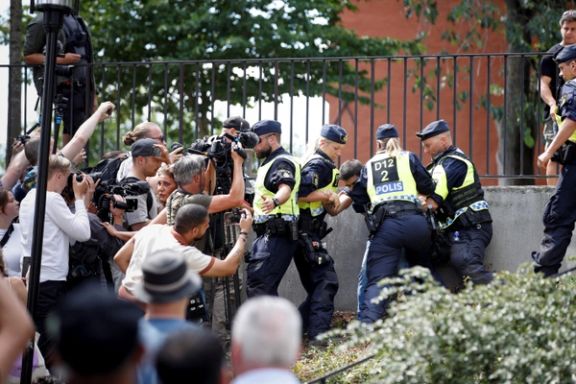
Swedish authorities said on Tuesday that Iran hacked a messaging service last year, sending thousands of messages urging Swedes to retaliate against Quran burners.

Swedish authorities said on Tuesday that Iran hacked a messaging service last year, sending thousands of messages urging Swedes to retaliate against Quran burners.
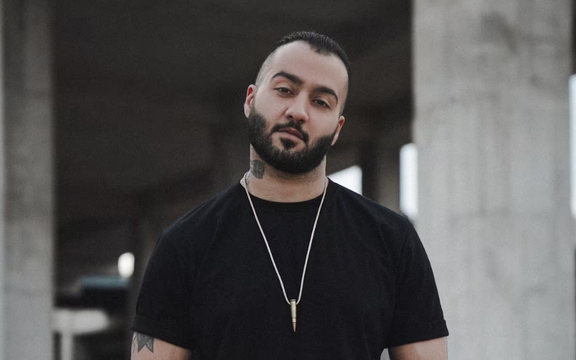
Ahead of Iranian President Masoud Pezeshkian's address at the UN on Tuesday, calls for the release of dissident rapper Toomaj Salehi have intensified, driven by growing pressure from his family, legal team, and human rights organizations.
Human rights advocates are using Pezeshkian’s visit to New York as an opportunity to highlight Salehi’s continued imprisonment and Iran’s broader human rights violations.
In a joint statement from his legal team at Doughty Street Chambers, Index on Censorship, and the Human Rights Foundation, they emphasized that Salehi's music and activism have been pivotal to the "Woman, Life, Freedom" movement, challenging corruption and exposing human rights abuses by Iranian authorities. The statement also underscored that, in retaliation for his outspoken work, Salehi has faced over three years of judicial harassment, including imprisonment, beatings, and torture.
The "Woman, Life, Freedom" movement, sparked by the death of 22-year-old Mahsa Amini while in police custody in 2022, saw months of nationwide protests. Human rights organizations estimate that at least 551 protesters were killed, including 68 children and 49 women, in the violent crackdown by state security forces. In March, the UN Fact-Finding mission’s report concluded that the suppression of these protests and systemic discrimination against women and girls amounted to severe human rights violations, with many acts constituting "crimes against humanity."
Salehi was first arrested in September 2021 following the release of his track “Mouse Hole,” and was detained again in October 2022 during the "Woman, Life, Freedom" uprising, facing charges including “corruption on earth,” which led to a death sentence in April.
While the death sentence was overturned by Iran's Supreme Court in June, Salehi remains imprisoned, with new charges tied to his music and activism. According to the statement, authorities have denied him adequate medical care, leaving him in severe pain from injuries sustained under torture.
Two urgent appeals have been filed with the UN on Salehi's behalf. In May, his legal team submitted an appeal to two UN Special Rapporteurs, and in July, the Human Rights Foundation lodged an individual complaint with the UN Working Group on Arbitrary Detention.
In the statement, Salehi’s family and friends also voiced concerns over his continued detention. Negin Niknaam, his friend and social media manager, highlighted that "Toomaj remains unlawfully [detained] in Dastgerd prison despite the absence of an arrest order and is in urgent need of medical care to prevent permanent disability." She called on UN Member States to hold Iran accountable and push for his immediate release.
Salehi's cousin, Arezou Eghbali Babadi, added that "international solidarity has been key in overturning Toomaj’s death sentence" and urged the global community to pressure the Iranian president for his release "before it’s too late."
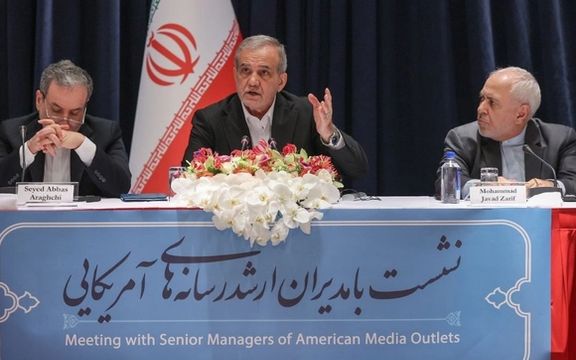
Masoud Pezeshkian is set to become the seventh Iranian president to address the UN General Assembly. But how did his predecessors navigate their visits to New York, and what were their key moments on the world stage?
Pezeshkian’s supporters hope his Tuesday UNGA speech and meetings in New York may help present a better, more peaceful image of Iran to the world and pave the way for lifting US sanctions.
Others believe he has no authority to do anything other than reiterating Supreme Leader Ali Khamenei’s anti-American, anti-Western, anti-Israeli stances and will stay away from meeting US and other Western officials like some of his predecessors.
Between 1979 and 1998 Iranian presidents rarely addressed the UN General Assembly in person. The exceptions were Mohammad-Ali Rajai who visited New York once during his four months of presidency in 1981, a year after Iraq invaded Iran, and then-President Ali Khamenei in 1987.
Mohammad-Ali Rajai 1981
Iran's second president, who had flown to New York immediately after symbolically visiting the war front spoke against both the United States and Russia for supporting Iraq in the war.
Rajai raised many eyebrows by removing one of his socks and putting his foot on the podium to show the scars of torture in prison before the Revolution.
Ali Khamenei (1981-1989)
Khamenei called on world leaders to hold an international tribunal like the Nuremberg tribunal to try Saddam Hussein and accusing the UN Security Council of supporting his invasion of Iran in September 1980 that led to a destructive eight-year war.
Akbar Hashemi-Rafsanjani (1989-1997)
Iran's fourth president never attended UNGA on whose behalf then Foreign Minister Ali-Akbar Velayati addressed the meetings. No reasons were ever offered for his absence at these international meetings. He was accused of being involved in two terror bombings of Jewish targets in Argentina in 1992 and 1994 and this could have played a role in his absence
Mohammad Khatami (1997-2005)
The Islamic Republic’s fifth president, the reformist Mohammad Khatami, was the first Iranian president after Khamenei to address the UNGA in 1998. Khatami argued in his well-received speech against Samuel Huntington’s theory of a Clash of Civilizations and proposed Dialogue Among Civilizations as the best alternative.
He also proposed that the year 2001 be proclaimed the Year of Dialogue Among Civilizations by the United Nations. The UN adopted his proposal in November 1998.
The 9/11 attacks and the US invasion of Afghanistan to remove the Taliban happened during the Year of Dialogue Among Civilizations after which Khatami delivered only one more speech at UNGA to defend his theory.
Khatami did not attend the speech by the US President, Bill Clinton in 1988. Clinton, however, attended Khatami’s speech. This was the only time a US president sat for the UNGA speech of any Iranian president.
Clinton was reportedly keen on a meeting that the Iranian delegation turned down, reportedly because Supreme Leader Ali Khamenei refused to give Khatami the green light.
Mahmoud Ahmadinejad (2005-2013)
The populist Mahmoud Ahmadinejad has a record of visiting New York eight times during his presidency to address the UNGA.
After his first UN speech in 2005, Ahmadinejad reportedly told a prominent Shia cleric that he felt surrounded by a halo-like aura of light while addressing world leaders. This claim drew widespread criticism from across the political spectrum.
He always attacked the US and other Western powers, Israel and NATO in his speeches. In 2010, he proposed to name 2011 the Year of Nuclear Disarmament and Nuclear Energy, as Iran's own nuclear program was under the UN Security Council's spotlight and sanctions were being imposed on Tehran.
The delegations of the US and other EU countries as well as Canada, Australia, New Zealand, and Costa Rica walked out in protest to his controversial stances before his speech in 2011. He accused the US government of being behind the 9/11 attacks in the speech.
Hassan Rouhani -(2013-2021)
During his eight years of presidency, Rouhani attended the annual UNGA twice, in 2013 and 2015.
Rouhani came under massive criticism from hardliners at home for accepting a brief phone call with then-President Barak Obama during his first visit to New York.
Around 100 hardliners protested against Rouhani at the airport upon his return to Tehran and threw shoes at his vehicle as a sign of disrespect.
During the same visit, Foreign Minister Mohammad-Javad Zarif and Obama had a brief, unplanned conversation in the UN hallways.
Ebrahim Raisi (2021-May 2024)
Raisi visited New York twice, in 2022 and 2023, to attend the annual UN General Assembly (UNGA) meetings.
Raisi displayed a photo of Qasem Soleimani, the slain commander of the Revolutionary Guards (IRGC) Qods Force during his speech, which took place immediately after the death of the 22-year-old Mahsa (Jina) Amini in the custody of the morality police and the beginnings of the Woman, Life, Freedom protests.
Raisi had no high-profile meetings during his two UN visits. Members of most Western delegations were absent from his speeches.
Raisi’s second visit in which his wife and his daughter accompanied him was marred at home by a video clip showing a van being filled with boxes of baby food and kitchen paraphernalia in New York.
A member of his team claimed these were gifts the Iranian team had received from other participating officials and packed in those boxes.
The government also said Raisi’s wife had accompanied him to meet with the wives of other foreign officials and interviews with ABC, NPR, and Newsweek.

An audio file obtained by Iran International reveals that Masoud Pezeshkian, president of the Islamic Republic, told American media representatives in New York on Monday that Iran is ready to disarm if Israel does the same.
Pezeshkian said, "We are prepared to give up all our weapons, provided Israel also disarms, and an international organization steps in to ensure security in the region. We don't even need them—we know how to secure our own safety."
Pezeshkian who spoke at length about Israel being the main culprit in the region, attacking others and seeking war, also briefly mentioned the war in Ukraine. He denied recent accusations that Iran has supplied ballistic missiles to Russia and called for a peaceful resolution to the conflict. However, he did not mention Iran’s delivery of around 8,000 Shahed suicide drones to Russia since mid-2022.
Just before his trip to New York to attend the UN General Assembly, Pezeshkian had said that one his goals during the visit was to improve the image of the Islamic Republic in the world.
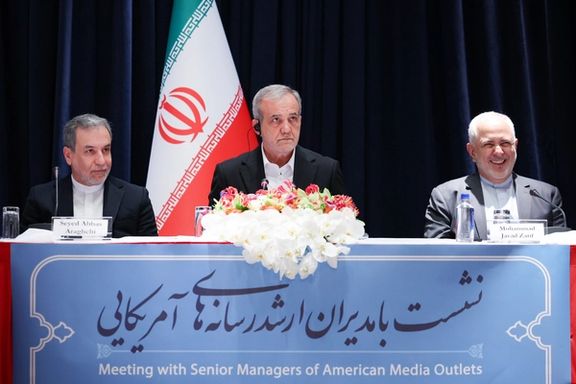
In the meeting with reporters the Iranian president stated, "A terrorist is a terrorist, whether Arab, non-Arab, or Persian, whether it's Israel, the US, or Iran. If they commit terrorism, they are a terrorist. But it’s not acceptable to call one side’s actions self-defense while labeling the other a terrorist for the same actions." During the hour-long event, Pezeshkian focused on portraying Israel as engaged in one-sided aggression. “We want to live in peace, we don’t want war. It’s Israel that is seeking to provoke a full-scale conflict."
Addressing the media representatives present at the meeting, Pezeshkian said, "This is the essence of our message, and you can publish it however you wish. Help us find a way not to go to war. Let’s resolve what can be solved through dialogue, not with missiles and weapons."
He added, "Help bring peace and security to the world. We are ready. We don’t want war. We have no desire for any country’s land, nor are we seeking to cause disruption anywhere."
Pezeshkian clarified, "This doesn’t mean there aren’t some Iranians who may be involved in certain actions in some places. It’s possible, just as it’s possible for people in our own country to rise up and do certain things. But to say that ‘we’ are behind these actions—this isn’t true. There are individuals who don’t adhere to the framework and act independently. Don’t attribute their actions to us."
However, throughout four decades of its existence the Islamic Republic leaders have often threatened regional countries for not siding with Tehran in its campaign against Israel and the United States, while calling for destruction of the Jewish state,
Pezeshkian also declared, "We speak truthfully. I’m not skilled in politics and deception. That’s why I want people to speak honestly and tell the truth, so we don’t feel deceived later. We don’t deceive anyone." He added, "By God, we are human too, and we are not warmongers."
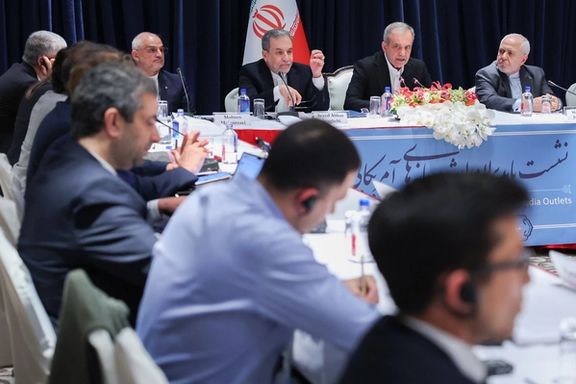
However, hours after Pezeshkian’s remarks were published, Iran’s Foreign Minister Abbas Araghchi, issued a statement saying, "I reject the reports by some media outlets claiming that Masoud Pezeshkian said the Islamic Republic is ready to de-escalate with Israel. Mr. Pezeshkian never made such remarks."
Araghchi also told Tasnim News, affiliated with the IRGC, "Contrary to what has been reported, Dr. Pezeshkian strongly condemned the crimes of the Zionist regime in Gaza and its aggression against Lebanon during a meeting this morning in New York with some American media executives. He stressed that these crimes are in violation of all human and international standards and must be stopped."
He added, "He clearly stated that these crimes, including the assassination of martyr Haniyeh in Tehran, will not go unanswered, and the response will be delivered in due time."
Pezeshkian also condemned Israel’s operations in Gaza and Lebanon on Monday, accusing Israel of setting a trap to drag the Islamic Republic into a full-scale war. He reiterated that Iran does not seek war but wants peace and security in the region.
On Monday, in separate meetings and statements, Pezeshkian accused Israel of trying to provoke the Islamic Republic into war, while also affirming Iran’s resolve to avenge the killing of Ismail Haniyeh in Tehran.
Pezeshkian, addressing the delay in what the Islamic Republic calls its "harsh response" to avenge the killing of Ismail Haniyeh, the former head of Hamas' political bureau, pointed to Iran's consultations with Western countries. He remarked, "We were told a ceasefire agreement between Israel and Hamas would be reached within a week, but that week never arrived. Instead, Israel has continued to escalate its attacks."
Araghchi further emphasized, "The Islamic Republic will certainly not remain indifferent to the recent Zionist regime's aggression against Lebanon and will fully defend and support Lebanon."
However, Tasnim News highlighted Pezeshkian’s emphasis on the need to end Israel’s military operations and establish peace and security in its reports on his Monday meetings with leaders from several countries.
Disregarding repeated accusations from Western countries that the Islamic Republic supports terrorism and violates international law and treaties, Pezeshkian stated, "We believe global peace and security can only be achieved if all nations respect international treaties and, regardless of power dynamics, stand united against any country committing acts of aggression."
According to Tasnim, in a meeting with Viola Amherd, the President of Switzerland, Masoud Pezeshkian stated, "In our foreign policy, we seek to establish stability, security, and peace in the region, while the Zionist regime is striving to incite war and create instability."
On Monday, Pezeshkian also met with the President of the European Council and the President of Turkey.
According to Iranian media, he is also scheduled to meet with King Abdullah II of Jordan and French President Emmanuel Macron. The Gaza war and the conflict between Hezbollah and Israel are expected to be the main topics of Pezeshkian's discussions in New York.
Masoud Pezeshkian's trip to the United States has sparked significant criticism on social media. Reports indicate that contrary to initial news, he traveled to New York with a 40-member delegation, including his two sons, daughter, and son-in-law.
The group also includes three key figures from the Islamic Republic's 2015 nuclear negotiation team: former Foreign Minister and current deputy to Pezeshkian, Mohammad Javad Zarif; Foreign Minister Abbas Araghchi; and Araghchi's deputy, Majid Takht-Ravanchi.
However, it appears unlikely that any meetings will take place between officials of the Islamic Republic and the US government during this trip.
Media outlets affiliated with the Islamic Republic quoted Abbas Araghchi as stating that he will not meet with US Secretary of State Antony Blinken or any Biden administration officials, as he said such a meeting is "not advisable."
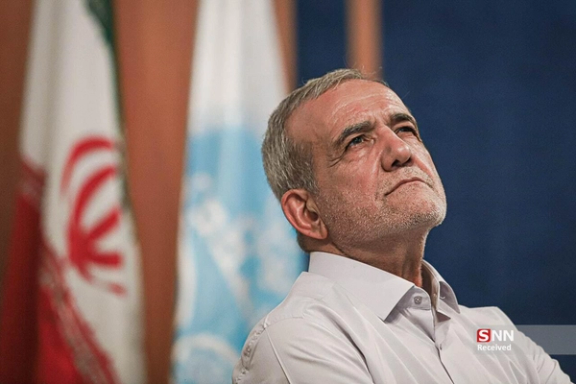
A prominent Iranian "reformist" journalist has warned that the Pezeshkian administration is doomed to fail due to negative coverage from state TV, Iran’s hardline media, and foreign-based Persian outlets.
In an interview with centrist Ham Mihan daily which was widely carried by other Iranian media, Ahmad Zeidabadi said "What Pezeshkian is doing is like competing in a speech contest while his mouth is kept shut!"
He pointed out that while Masoud Pezeshkian was holding a news conference in Tehran earlier this month, the state TV was conducting a poll showing negative attitudes toward the President and his cabinet.
Zeidabadi noted that official state media is not supposed to oppose the government's policies, pointing to the hardline rhetoric of state TV, which is intended as a public relations tool for the administration. Despite the challenging media landscape in Iran, Zeidabadi argued that the role of scrutinizing the government's performance should fall to independent media.
He also criticized the state TV's monopoly on broadcasting in Iran. "The presidential administration does not have an exclusive media platform of its own and at the same time it is being targeted by sinister propaganda from the most important state-owned media outlet," the journalist observed.

Iran’s state TV is indirectly controlled by Supreme Leader Ali Khamenei through high-level appointees. Currently, well-known hardliners control programming at the sprawling organization, which employs around 40,000 people, with a constantly growing budget, while public services and schools suffer from serious financial problems.
Zeidabadi also accused Persian-language media outside Iran, whose popularity he attributed to the inefficiency of Iranian state TV, of aggressively broadcasting anti-government propaganda into the country. "In such an environment, the Pezeshkian administration stands no chance of success," he reiterated.
In fact, organizations such as the BBC Persian Service and Iran International simply play the role of a non-governmental Iranian media, in the absence of press freedom within the country.
Zeidabadi further said, presumably addressing the state TV, that the time for highlighting the problems is over and it is now time to offer solutions. He stressed that if the state TV does not change its approach, Pezeshkian and his cabinet will certainly fail.
In a debate on the YouTube Channel of Free-Thinking School, former deputy Parliament Speaker Mohamad Reza Khatami, a brother of former "reformist" President Mohammad Khatami and conservative Iranian sociologist Parviz Amini held a debate entitled, "Is the national accord government likely to fail?"
In the debate, Mohammad Reza Khatami emphasized that Iran's new generation no longer cares about the actions or statements of former leaders like Rafsanjani and Khatami. He noted that the younger generation sees these figures as part of the government that has ruled for the past 45 years. Khatami argued that if national accord is truly the goal, the government should at least offer meaningful gestures, such as improving internet access and addressing women's issues. He added that if officials want even critics of the government to participate in elections, they must create an environment where voters can expect real change in governance.
He urged the government to recognize the growing disconnect between its views and those of the new generation.
Parviz Amini argued that the composition of Pezeshkian's cabinet is not the key issue, suggesting that national accord isn’t achieved by simply appointing individuals from different groups to government roles. He emphasized the need for a central, cohesive vision, explaining how the administration plans to tackle issues like inequality and energy consumption. Amini stressed that Pezeshkian’s focus should be on social development, addressing poverty and inequality, particularly in education and healthcare.
He further noted that even past presidents with clear ideas and plans failed, warning that Pezeshkian, lacking a concrete plan, could face an even worse fate.
Comments under the video were far less restrained. One user bluntly stated that Pezeshkian is doomed to fail, while another argued that reforming the current system is impossible. A third commenter, rejecting the conservative-reformist divide altogether, warned, "We'll send all of you—reformists and conservatives—straight to hell!"
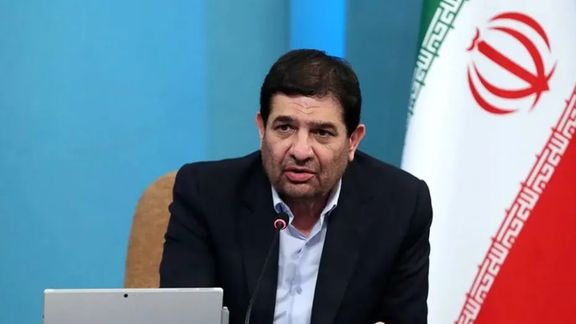
Iran's Supreme Leader Ali Khamenei appointed a former top official and economic kingpin in charge of the Ayatollah's sprawling economic interests and Iran's COVID-19 response as a formal advisor.
The decision highlights the persistent role of Mohammad Mokhber in the theocratic system's inner circle following the death of President Ebrahim Raisi - under whom he served as vice president - in a helicopter crash earlier this year.
In his appointment decree, Khamenei said Mokhber's responsibility would be to continue the Raisi’s administration's "prudent policies ... (especially) identifying and utilizing young and elite talents".
The precise scope of Mokhber’s duties as the Supreme Leader’s assistant remains unclear, but his appointment comes as part of efforts by Khamenei to further consolidate control over the executive branch.
Mokhber, a stalwart personal ally of Khamenei, previously managed several large economic entities for over a decade.
Mokhber’s role in COVID-19 response
Mokhber’s career took on a higher profile during the COVID-19 pandemic, when he served as the head of the Execution of Imam Khomeini's Order (EIKO), an organization that oversees vast economic interests in Iran. Under his leadership, EIKO took charge of producing Iran’s domestically developed COVID-19 vaccine, COVIran Barekat and monopolized the import of COVID-19 test kits.
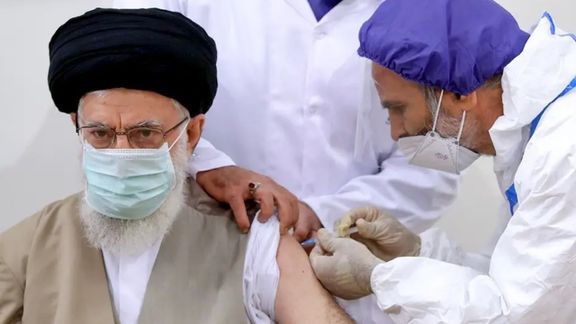
During the pandemic, Mokhber introduced his daughter Tayebeh as the first recipient of the Barekat vaccine, to emphasize its safety. However, the domestic vaccine rollout was widely criticized.
According to official reports, 136,166 Iranians died from COVID-19 between February 2020 and February 2023. A scientific study published after the pandemic concluded that if Iran had not insisted on using the Barekat vaccine and instead used available international vaccines, an estimated 50,000 lives could have been saved.
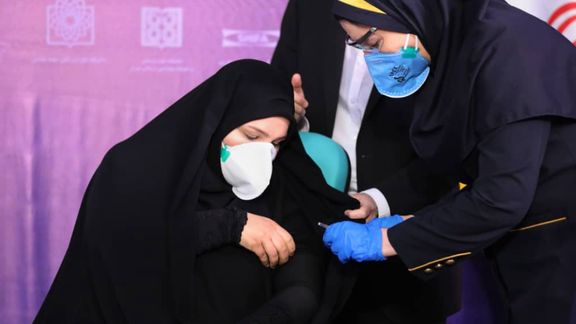
Although Mokhber left his role at EIKO after the pandemic subsided, his involvement in the state’s pandemic response including the monopoly on test kit imports and the domestic vaccine’s development, may define his legacy.
His transition into the position of Khamenei’s assistant highlights the trust placed in him despite the controversies surrounding his pandemic-era leadership.
Rise to power
Born in 1955 in Dezful, Mokhber hails from a religious family. His father, Abbas Mokhber, was a local preacher and held various roles after the 1979 revolution. In 1995, Mokhber founded an institute in his father’s name which remains under the management of relatives.
Before the revolution, Mokhber was a member of the Mansouroun group, a faction that eventually became part of the Mojahedin of Islamic Revolution Organization. Some have accused the group of involvement in a deadly arson attack on a cinema in Abadan which outraged Iranians in the run-up to the Islamic Revolution.
Mokhber’s rise to power began in the 2000s, when he joined the Foundation for the Oppressed, an economic organization under the control of Khamenei. Working under Mohammad Forouzandeh, another member of the Mansouroun group, Mokhber was involved in the foundation’s commercial and transportation sectors.
His ascent continued with his role in the exclusion of Turkish telecom giant Turkcell from the Irancell project. Mokhber reportedly played a role in convincing the Iranian parliament to replace Turkcell with South Africa’s MTN, positioning himself as a key figure in the economic and political decisions. Shortly afterward, in 2007, Khamenei appointed him as the head of EIKO, an organization with vast financial resources and little transparency.
Mokhber’s economic influence
During his 14-year tenure at EIKO, Mokhber expanded its economic reach, particularly through the Barkat Pharmaceutical Group, a conglomerate of 20 pharmaceutical companies, some of which had been confiscated from private owners.
The Barkat group became central to Iran’s pandemic response, even before the development of the COVID-19 vaccine, as it monopolized the importation of COVID-19 test kits.
Mokhber’s family connections have also come under scrutiny. His son, Sajjad Mokhber, has been named in reports linking him to debts and privileged positions in companies connected to the Pasargad Bank, another entity reportedly tied to EIKO.
Leaked documents in early 2024 implicated Sajjad in oil trading deals, raising questions about the extent of the Mokhber family’s influence in Iran’s economy.
Last year, there were several instances in Sweden where Islam's holy book was publicly burned, triggering widespread outrage across the Muslim world and sparking concerns of potential jihadist attacks.
“The security police can establish that a cyber group acted on behalf of the Iranian Revolutionary Guard to carry out an influence campaign,” the Swedish Security Service stated.
“The purpose was, among other things, to paint the image of Sweden as an Islamophobic country and create division in society,” it added.
In a separate statement, the Swedish Prosecution Authority confirmed that its investigation had determined the Iranian state, through the Iranian Islamic Revolutionary Guard Corps, was responsible for the data breach.
The authority noted that while they had identified the hackers involved, they would not proceed with pressing charges.
“Since the perpetrators are acting for a foreign power, in this case Iran, we assess that the conditions for prosecution abroad or extradition to Sweden are lacking,” the statement read.
Last year, the US State Department named Iran as the world's number one state sponsor of terror.
Following the Quran burnings, Sweden heightened its terrorism alert last year. The desecration led to widespread protests across several Muslim-majority countries, including a large demonstration outside the Swedish embassy in Baghdad. Iran's foreign ministry summoned Sweden’s charge d’affaires in Tehran. Also, Morocco recalled its ambassador in protest. At the same time, Turkey’s foreign minister condemned the incident, stating that it is “unacceptable to allow anti-Islam protests in the name of freedom of expression.”
The US also weighed in on the matter, with the deputy spokesperson for the State Department, Vedant Patel, noting in a briefing that burning religious texts is “disrespectful and hurtful.” He added, “What might be legal is certainly not necessarily appropriate".
In May, Sweden’s domestic security agency revealed that Iran had been planning terror plots in Sweden targeting dissidents and the country's Jewish and Israeli community.
The Swedish Ministry of Foreign Affairs said the revelations showing Iran was using Swedish crime gangs were being taken "very seriously".
In June, Iran and Sweden exchanged prisoners in a controversial swap. Iran freed Johan Floderus, a Swedish diplomat, and Saeed Azizi, a dual citizen. In return, Sweden released Hamid Nouri, an Iranian official convicted of war crimes for his role in the 1988 mass executions. Human rights groups have strongly criticized the exchange, calling it an act of "hostage-taking" by Iran.